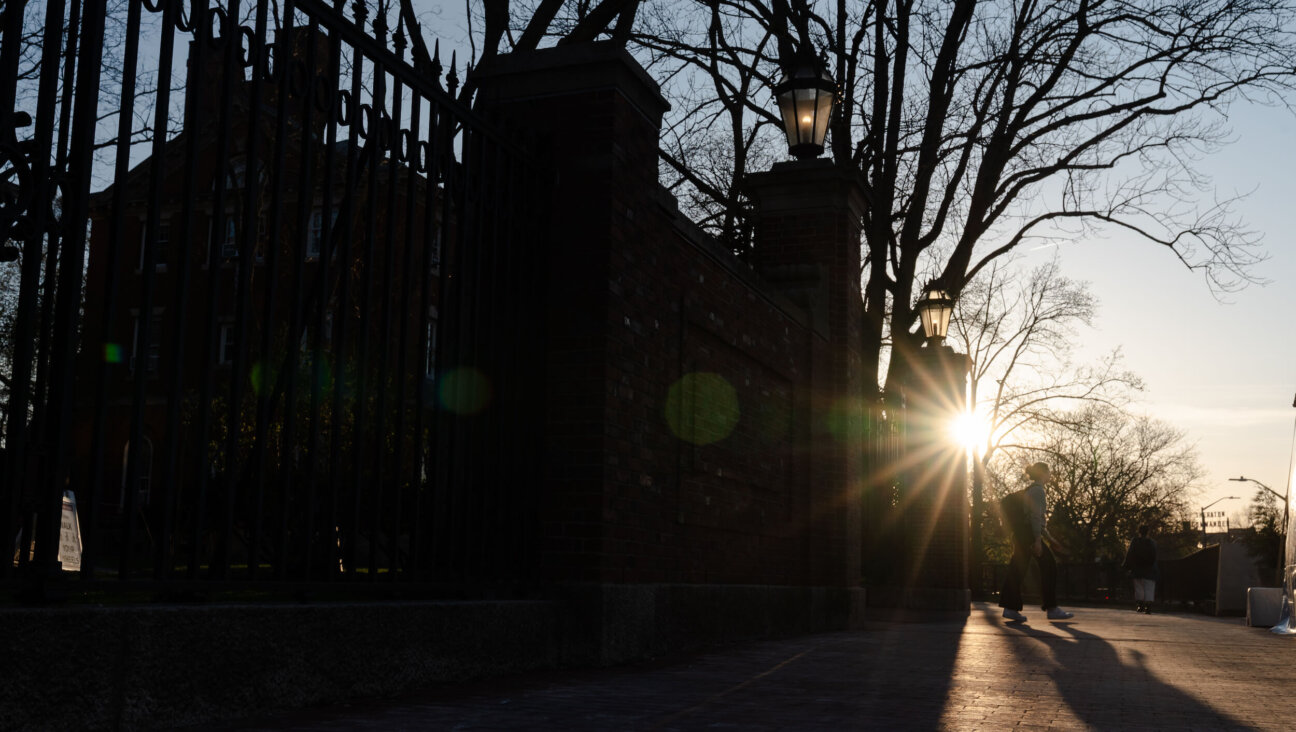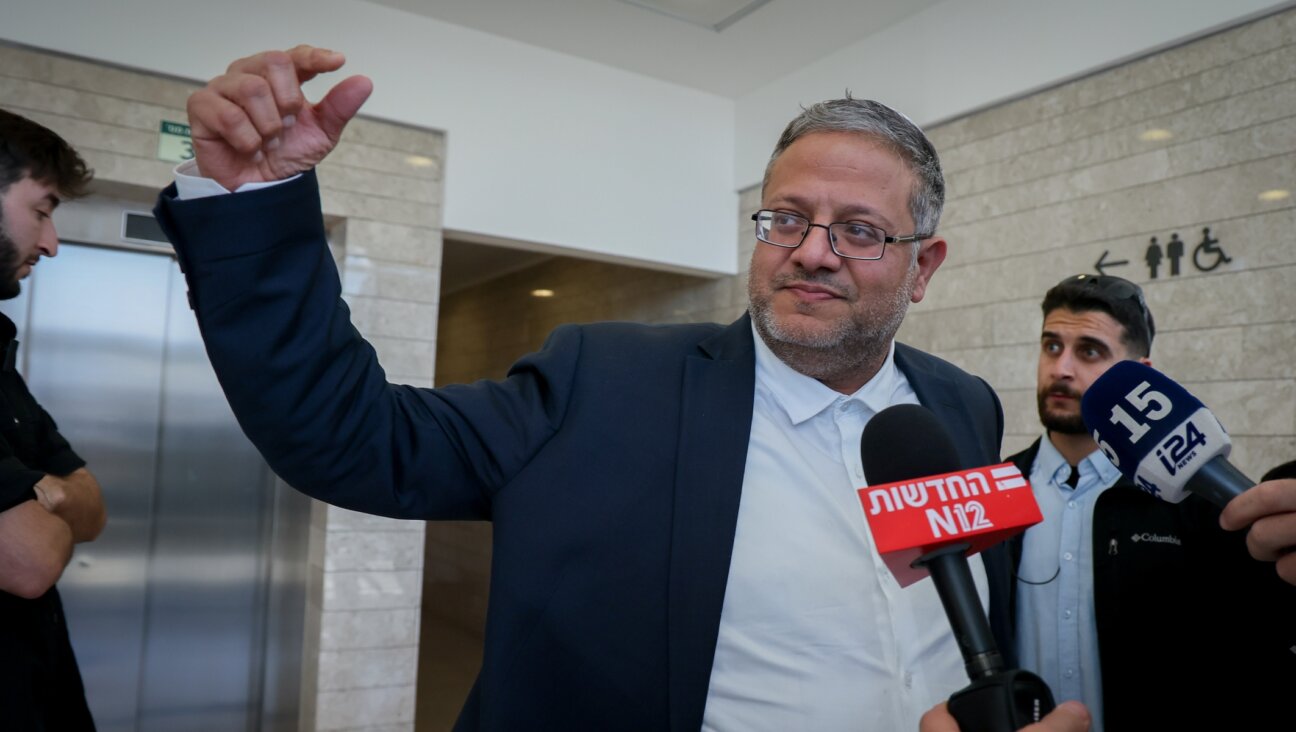At Federations’ Confab, Talk Focuses on Israeli Policies
JERUSALEM — It happens every year: Leaders of Jewish communal federations across North America gather in a different city to see old friends and meet new ones, to hear speakers on the hot topics facing Jews in their community and worldwide. Some issues are perennial and some problems persist, but this year, because the General Assembly of United Jewish Communities was convened in Israel, delegates faced a particular quandary: What do you do if you’re a loyal Jew who supports Israel, but has trouble supporting the political policies of its government?
That mixed feeling was perhaps best reflected in the reception given for Prime Minister Sharon at the opening ceremony Sunday night. Delegates greeted his entry and exit with a tepid applause, an acknowledgment that this was indeed the prime minister of the Jewish state, but hardly a ringing political endorsement. And though they stood in the middle of his 16-minute speech and clapped enthusiastically when he said, “Our enemies have yet to understand that the Jewish people cannot be broken and will never be broken,” it was clear that a broad gap existed between the stage and the seats.
Solidarity with Israel was the message in holding this year’s assembly — known to insiders as “the G.A.” — in Israel this year, for only the second time in its 72 years. The last Jerusalem assembly, in 1998, drew barely 1,800 attendees, while 4,000 participated this week despite the continuing violence in the region. Sources said another 1,000 might have come had there been enough flights to bring them over.
Happy to be here, the delegates enthusiastically participated in the day-long discussion sessions on themes ranging from philanthropy and fundraising to immigration to Israel and America, deepening Jewish spiritual connections and trends in volunteerism.
But while the G.A. is emphatically billed as a non-political event, much of the talk — inside the lecture halls and out in the corridors — was about the current Middle East situation. The most heavily attended sessions were about the U.S.-backed road map to peace, the war on terrorism and prospects for maintaining Israel as a democratic Jewish state.
At a pre-convention news conference the president and CEO of UJC, Stephen Hoffman, stated flatly that when it comes to Israeli government policy, “We’re going to support whatever they do.” But the message during the convention was far more mixed. Numerous speakers told delegates that it was not just permissible but essential to join in Israel’s political debate, that they must separate their support for Israel in principle from their views on specific government policies.
“I feel very strong emotional affinity to American Jewry and am deeply moved by your solidarity and your support,” said Hebrew University philosophy lecturer Yaron Ezrahi, in a session titled “Israel as a Jewish Democratic State.” “However, solidarity with Israel is not always an uncritical solidarity with the Israeli government. We need to be courageous — not conformists, but courageous, independent and critical, and optimistic.”
Ezrahi promptly offered an example by criticizing the Sharon government, saying the prime minister mouths support for the road map but in fact “has not removed one illegal settlement. To identify with this is not solidarity with Israel and it’s not shaping our future.”
In the same session, Knesset member Matan Vilnai, a former deputy chief of staff and a Labor Party prime ministerial contender, went even further. “To have a Jewish democratic state, first of all we must separate from the Palestinians,” he said. “The main threat to our existence is not the Arabs, it’s us, and we have to understand that.”
Yet despite being given this green light to engage with and criticize Israeli policy, many delegates insisted they wouldn’t — or couldn’t — take that step.
“Jews and non-Jews have the right to agree or disagree with Israel’s policies,” said Diane Seder, president of the Jewish federation in Madison, Wis., home to 5,500 Jews. “But most people here believe that the way we connect to the Israeli people is through social services. I always look at it like — we may not like President Bush, but that doesn’t mean we don’t give to the United Way. But I agree, people do struggle: if we don’t agree with Israel’s policies, how do we as American Jews let them know it? Some Jews say ‘I’m going to let them know it because I won’t give any money.’ But that’s hurting the wrong people. And that’s the problem. So I don’t know what the answer is.”
Marilyn Cohen, director of the Jewish federation in Sioux City, Iowa, a community of 500 Jews, said the current situation doesn’t allow for criticism. “Three, four years ago, when it appeared that maybe there was a little light at the end of the tunnel for Israel, and maybe things were heading in the right direction, you could feel a little freer to put your toe in the water of saying something [critical], but that freedom is closing down a little because of the state of war.”
Steven M. Cohen, a sociologist at the Hebrew University, said the dilemma is not just between those who support the right or the left, but is a vexing internal problem for many individuals.
“Some Jews believe that in a time of crisis like this, the responsibility of all Jews is to rally to the support of Israel and defend it against all the antisemites and anti-Zionists that are out there,” said Cohen, in an interview with the Forward. “Others believe that when Israel is acting in ways that are maybe immoral, detrimental, unwise, the responsibility of Jews is to be critical of the policies of Israel. And the truth is, we are all both types of Jews simultaneously — we both want to defend Israel, and we want to be part of the conversation to make Israel smarter, stronger, wiser and more moral.”
Susie Gelman of Washington, D.C., a co-chair of the assembly, said that because she does not live in Israel and pay taxes, she didn’t feel she could speak out as an official.
“I’m not saying we don’t have a right to criticize,” Gelman said. “I think there’s a question about how much American Jews can get involved in expressing our political opinions when we don’t live here and we don’t have the right of citizens. On the other hand, we are part of one community, and I think we do have a role to play. But it is not correct to say that people coming here is an expression of support for one government or another. It’s an expression of support for the people and the state of Israel. It’s not an expression of political support one way or the other.”
The Forward is free to read, but it isn’t free to produce

I hope you appreciated this article. Before you go, I’d like to ask you to please support the Forward.
Now more than ever, American Jews need independent news they can trust, with reporting driven by truth, not ideology. We serve you, not any ideological agenda.
At a time when other newsrooms are closing or cutting back, the Forward has removed its paywall and invested additional resources to report on the ground from Israel and around the U.S. on the impact of the war, rising antisemitism and polarized discourse.
This is a great time to support independent Jewish journalism you rely on. Make a Passover gift today!
— Rachel Fishman Feddersen, Publisher and CEO
Most Popular
- 1

News Student protesters being deported are not ‘martyrs and heroes,’ says former antisemitism envoy
- 2

News Who is Alan Garber, the Jewish Harvard president who stood up to Trump over antisemitism?
- 3

Fast Forward Suspected arsonist intended to beat Gov. Josh Shapiro with a sledgehammer, investigators say
- 4

Politics Meet America’s potential first Jewish second family: Josh Shapiro, Lori, and their 4 kids
In Case You Missed It
-

Opinion Why can Harvard stand up to Trump? Because it didn’t give in to pro-Palestinian student protests
-

Culture How an Israeli dance company shaped a Catholic school boy’s life
-

Fast Forward Brooklyn event with Itamar Ben-Gvir cancelled days before Israeli far-right minister’s US trip
-

Culture How Abraham Lincoln in a kippah wound up making a $250,000 deal on ‘Shark Tank’
-
Shop the Forward Store
100% of profits support our journalism
Republish This Story
Please read before republishing
We’re happy to make this story available to republish for free, unless it originated with JTA, Haaretz or another publication (as indicated on the article) and as long as you follow our guidelines.
You must comply with the following:
- Credit the Forward
- Retain our pixel
- Preserve our canonical link in Google search
- Add a noindex tag in Google search
See our full guidelines for more information, and this guide for detail about canonical URLs.
To republish, copy the HTML by clicking on the yellow button to the right; it includes our tracking pixel, all paragraph styles and hyperlinks, the author byline and credit to the Forward. It does not include images; to avoid copyright violations, you must add them manually, following our guidelines. Please email us at [email protected], subject line “republish,” with any questions or to let us know what stories you’re picking up.











